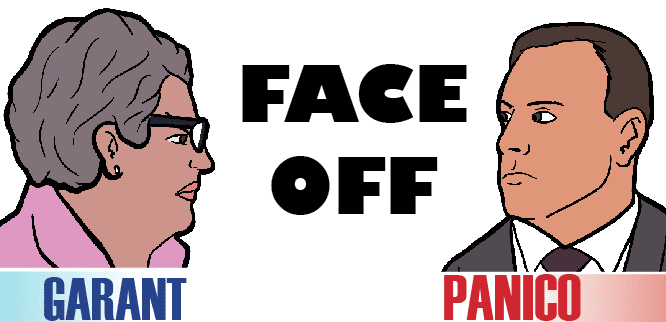Last week’s special election for the Town of Brookhaven’s 3rd Council District has both major political parties finding silver linings.
Former Brookhaven Councilman Kevin LaValle (R-Selden) vacated his seat in February following a January special election for town clerk. To fill the vacancy and complete LaValle’s unexpired term ending in December, Republican Neil Manzella — also of Selden — defeated Democrat Alyson Bass from Centereach on Tuesday, April 25, by a 57-43% margin, according to an unofficial tally by the Suffolk County Board of Elections.
Manzella’s win reinforces his party’s stronghold on the town government. Republicans again hold a 6-1 majority on the Town Board and occupy nine of the 10 elected offices townwide. Councilmember Jonathan Kornreich (Stony Brook) is the lone Democrat.
“While I wish that there were more people that did vote,” Manzella said, “I am very happy with the decent size turnout for a special election,” which was just over 2,800 ballots cast. “I think both sides did a great job of getting that vote out.”
To Bass, he added, “I think that she should be very proud. They held an incredibly respectable campaign.”
Since the establishment of councilmanic districts in 2002, a Democrat has never held the 3rd District. Despite their historical struggles, there are some positive takeaways for the losing side.
LaValle won CD3 in 2019 by more than 30 points. Bass cut that margin by more than half.
“Given the fact that my campaign was more of a grassroots campaign, I feel very proud for the level of fundraising that we did and with the outcome,” Bass told TBR News Media. “We were way outspent, we were outmanned. And I think that our numbers were very strong.”
Two-part election
Manzella’s victory celebration will be short-lived as both CD3 candidates are already back on the campaign trail for the general election.
“While I did win now, I will be the acting councilman but only through [December],” Manzella said. “This doesn’t stop. This campaigning continues straight through November.”
Bass also had this understanding, indicating that when she accepted the nomination for the special election, she committed to running in November regardless of its outcome.
“The four-year term was always the goal,” she said, adding that her campaign will continue through November.
Heads of the ticket
The CD3 race provides an early measure of public moods ahead of the townwide elections later this year. As the focus shifts away from the 3rd District, all eyes are on the top of the ticket, where there is an open contest.
Incumbent Brookhaven Town Supervisor Ed Romaine (R) will not headline the ticket for the first time in over a decade, instead pursuing the county’s top office in the race to succeed Suffolk County Executive Steve Bellone (D), who is term-limited. Romaine’s opponent will be Democratic nominee, Dave Calone.
Brookhaven Deputy Supervisor Dan Panico (R-Manorville) and Village of Port Jefferson Mayor Margot Garant, a Democrat, have each secured their party’s nod for town supervisor.
In separate interviews, both candidates reflected upon the outcome in Middle Country and its implications for their respective quests to succeed Romaine.
“I think Ms. Bass should be extremely proud of herself,” Garant said, referring to the 14% margin of victory. “That’s a pretty significant gain, especially in a special election where you only had about 3 percent voter turnout overall in that district.”
Despite her favored candidate coming up short, Garant said she and her party are “encouraged by that result, and we’re going to continue to work on the messaging and the issues as they exist and continue to make sure we’re knocking on doors, making people aware of what the existing conditions are.”
Panico sang a slightly different tune than his opponent, though also optimistic for November. The deputy supervisor referred to the outcome as “a very strong message for our team” as the party pivots to the general election.
Manzella’s win, Panico said, reflected the strength of the Republican committee’s efforts and the resonance of its platform with Brookhaven voters. He further regarded the outcome as a vote of confidence for the current Town Board.
“When you’re doing the right thing by the residents — and the residents are very aware — they take notice,” Panico said. “The members of the Town Board on my team, I expect, will be reelected as well” in November.
Six months out of the general election, Panico said he has already begun campaigning townwide, expressing confidence that his campaign is registering with Brookhaven residents and forecasting a favorable outcome.
“I expect to be victorious in November and plan on running a vigorous campaign on the issues that matter to the residents of Brookhaven Town,” he said.
Based on recent electoral history, Garant’s campaign faces certain obstacles this election cycle. Her party has not held the supervisor’s chair since 2012 when Mark Lesko resigned mid-term, to be replaced by Romaine.
The Port Jeff mayor nonetheless remained hopeful about her prospects, viewing her platform as appealing to the centrist wing of the town — a faction she believes will determine the victor.
“We think that we have a good platform,” she said. “We’re going to do our best to make sure that it resonates with the people not on the extremes, but with the majority of people who live here, which are the more moderate voters.”
Assessing political strategies
Anthony Portesy is chair of the Brookhaven Town Democratic Committee. Like Garant and Bass, he regarded the election result in CD3 as promising for the Democratic slate come November. The Brookhaven Town Republican Committee did not respond to requests for comment.
“I’m very, very encouraged” by last week’s outcome, Portesy said. “When you take out the conservative line, their margin of victory was a mere 73 votes. That is incredible for that district, and it shows the quality of the candidate that we put up in Alyson Bass.”
Panico viewed Manzella’s elevation to the Town Board as favorable for Republicans. Citing his party’s sizable majority in town government, he added why he believes Republicans are registering with the electorate.
“There’s no secret recipe,” the Republican supervisor candidate said. “There’s not one thing that I would point to with regard to the electoral edge. With regard to the political composition of the town representatives, it’s simply that the people who are elected do the job they were elected to do.”
He criticized the opposition party’s messaging, stating its recent electoral track record reflects an unpopular platform with voters.
“I think the state of the local Democratic Party is part and parcel of their platform,” he said. “As they embrace a platform that has been rejected by the vast majority of residents — regardless of political affiliation — in the Town of Brookhaven, I think that is going to continue to be a problem for their party, and it shows in their elections.”
Garant rejected this notion entirely, pointing to Bass’ narrowing of the gap in CD3 as a testament to her party’s upward trajectory. The mayor suggested that the current board has not adequately addressed Brookhaven’s multiplying quality-of-life concerns, which may begin cutting into its majority.
“I think there are a lot of people who are very concerned with the declining lifestyle and the declining quality of life and the conditions in their neighborhoods,” she said.
Portesy centered his focus around the town landfill, which constitutes a significant chunk of the town’s overall public revenue and is set to close in the coming years.
The party leader contended that the current board is ill-prepared for the looming budgetary shortfall precipitating from the facility’s eventual closure.
“The town dropped the ball on replacing the revenue for the landfill,” the Democratic committee chair said. “They love to tell you about the AAA bond rating, but the AAA bond rating doesn’t go into discussing the fact that that’s based on their present finances, not after the landfill closes and we’re losing millions and millions of dollars.”
Still, Portesy committed to recalibrating his party’s messaging over the coming weeks, working on expanding the Democratic get-out-the-vote initiative through additional door-knocking volunteers and other measures to generate voter interest and boost turnout.
“We’re going to be retooling our message over the next couple of months, making sure that we’re hitting the doors that we have to hit and making sure we’re convincing voters that our path is the path forward for Brookhaven Town,” he said.
Though beaten in round one, Bass kept an upbeat attitude for round two. “There are enough Democrats in this district and in this town to make us victorious,” she said. “We need to come across with messaging that resonates, and I think there are some strategic things we need to work on as far as unity and approach.”
She added that the small sample size last week was unreflective of the public will overall, suggesting a larger turnout in November could work in her favor.
Manzella, a former member of the town Republican committee, attributes much of his success to the party operation.
“Getting out there and spreading the word about an election, and then spreading the word of the candidate, is the most crucial part of any campaign,” the councilman-elect said. “Our committee has a lot of volunteers, a lot of people who are passionate about this. It’s that strength, as a unified whole, that is able to get this message out to the voters.”
Portesy viewed Romaine’s run for county executive as a unique opening for town Democrats. Given the scope of the town supervisor’s powers, the party chair maintained that filling that seat with a Democrat would be the committee’s primary objective.
“The vision for the town always comes from the executive,” he said. “Making sure that we get Margot Garant elected in November is going to go a long way,” adding, “Our number one goal is to take back the town supervisor.”
Both parties have just over six months before voters hit the polls on Nov. 7.
Illustration by Kyle Horne






